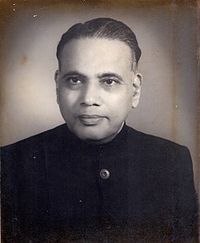- P. K. Kelkar
-
Purushottam Kashinath Kelkar
पुरुशोत्तम काशीनाथ केळकर
Born 1 June 1909
Dharwar, Bombay Presidency, British IndiaDied 23 October 1990 (aged 81)
Mumbai, Maharashtra, Union of IndiaNationality  Indian
IndianInstitutions Veermata Jijabai Technological Institute
Indian Institute of Technology Kanpur
Indian Institute of Technology BombayAlma mater Royal Institute of Science Bombay
Indian Institute of Science
University of LiverpoolNotable awards Padma Bhushan (1969) Purushottam Kashinath Kelkar was an Indian Scientist who is best remembered for being the founding director of the Indian Institute of Technology Kanpur, which was established in 1959.[1] He was also involved in the planning process for the establishment of the Indian Institute of Technology Bombay and served as its third director, for a period of 4 years.[2] Kelkar was instrumental in securing USA's technical collaboration in the establishment of IIT Kanpur, by persuading the then USA ambassador, John Kenneth Galbraith to locate the fledgeling institution on the outskirts of Kanpur, in North India.[3]
Contents
Education
PK Kelkar (PKK) was born on June 1, 1909, in Dharwar, Karnataka, India. His father, Kashinath Hari Kelkar, was a professor of philosophy in the Bombay Presidency. He was, therefore, subject to transfers within the area. As a result, PKK received his elementary and secondary education in both Bombay and Pune.
He graduated with honors in Physics in 1931 from the then Royal Institute of Science, Bombay. The next year he joined the Indian Institute of Science in Bangalore. He obtained the Diploma in Electrical Engineering in 1934. After that, instead of taking a job in industry, he decided to further his education.
He joined the University of Liverpool as a Ph.D. student. This was possible because of a scholarship from the Ichalkaranji Trust, which was established for financing deserving students. His subject for Ph.D. involved acoustical measurement and the performance of synchronous machinery on load. He completed his Doctorate in Electrical Engineering in 1937, under the guidance of Dr. J.C. Prescott. Just before finishing his doctoral work there was a fire in the laboratory. He lost a lot of his data and had to do the work all over again. After getting his Ph.D., he worked at Metropolitan Vickers as an intern in power systems.[4]
Career
PKK returned to India soon afterwards and joined his alma mater, IISc., as Lecturer in Electrical Engineering from 1937 to 1943. While he was there, he edited a newsletter for the electrical engineering department. Among his colleagues were well known physicists like Nobel Laureate C.V. Raman, Homi Bhabha, and Vikram Sarabhai. However, it seems that the politics of the Institute was not favorable to his growth and success.
In 1943, he accepted the post of Professor and Head of the Department of Electrical Engineering at the Victoria Jubilee Technical Institute in Bombay (VJTI), where he continued until 1956. Some of his colleagues, who knew PKK from Bangalore, thought it was a step down in going from a research institution like Indian Institute of Science to a diploma engineering college like VJTI.
His involvement with the planning of the Indian Institutes of Technology(IIT) began in mid-1955 shortly after it had been decided to be set up in Bombay as the second such institute. IIT Bombay was to be set up with financial and academic assistance from the USSR, mediated by the UNESCO.[4]
According to Prof. M.V. Hariharan of IIT Bombay,
“ Kelkar was a teacher–philosopher, able to see years ahead. He said that if engineering were the muscle for development, science was the brain. And that only with humanities could engineering education have a heart. Because then the instruction imparted to students became, in some sense, relevant to social needs.[4] ” When Kelkar moved to IIT Kanpur in 1959 as its first Director, he set about infusing that Institute with the same characteristics: accomplished faculty from diverse schools of thought, and a healthy curricular presence for the sciences and the humanities. By the mid-1960s, just a few years into its operations, as much as 40% of the B Tech curriculum at IIT Kanpur was given over to these foundations. According to a book on IIT Kanpur's history, Prof. Kelkar's influence helped IITK in ‘breaking out from the dark clouds of traditional systems in technical education’.[4]
Death
Dr. Kelkar died in October, 1990. IIT Kanpur, in 2002 renamed its central library as the P. K. Kelkar Library.[4] The Kelkar Alumni Lecture was also instituted in recognition to a person who had made distinct contribution to the technical education in India through building and developing IIT Kanpur[5] .
References
- ^ "History of IIT Kanpur". History of IIT Kanpur. iit.ac.in. http://www.iitk.ac.in/infocell/iitk/newhtml/history.htm. Retrieved 2010-04-01.
- ^ http://www.iitb.ac.in/about/directors.html
- ^ "Convocation Address by Dr. P.K. Kelkar". Convocation Address by Dr. P.K. Kelkar. iit.ac.in. http://www.iitk.ac.in/infocell/iitk/history/extracts.html. Retrieved 2010-04-01.
- ^ a b c d e Madhura Gopinath. "Info Page on PK Kelkar". "Dr. P.K. Kelkar". iPage. http://pkkelkar.info/. Retrieved 2011-03-02.
- ^ "Introduction to Kelkar Memorial Lecture Series". IITKAA Lecture Series. iit.ac.in. http://www.iitkalumni.org/lectures/index.htm. Retrieved 2010-04-19.
External links
Categories:- 1990 deaths
- Indian academics
- 1909 births
- Indian Institute of Technology Kanpur
Wikimedia Foundation. 2010.
